In August of 2017, thirty non-Native American Zen Peacemakers conducted two weeks of programs as another step in an years-long-arc of developing relationship and appreciation with the Lakota of South Dakota. Both weeks were based on and held by the Three-Tenets of Not Knowing, Bearing Witness and Taking Action. This reflection is from a participant of our 1st week, in which volunteers were immersed in the Cheyenne River Sioux Tribe Reservation community, where they constructed and helped rebuild community members’ homes.
The Horizon Greets You From Every Side:
Reflection on 2017 Zen Peacemakers Week of Service at Cheyenne River Sioux Tribe Reservation
By Caroline Contillo
CHEYENNE RIVER SIOUX TRIBE RESERVATION, SOUTH DAKOTA, USA. A downpour and bright flashes of dramatic lightening lit up the sky when our bus first pulled up at the La Plant Community center on the Cheyenne River Reservation for our week of service. Since I’m new to the Zen Peacemakers, I met most of the group for the first time when we gathered at the airport. We were hosted by Simply Smiles, a nonprofit organization doing a number of projects on the reservation, and they picked us up in Rapid City to bring us to La Plant, a small town in the interior of South Dakota.
I’d never seen such a big sky, with the horizon greeting you from every side. Not knowing came easy, because everything was new. At the same time, everyone was so welcoming. In addition to the Peacemakers, there were a few other volunteers who had some prior experience at the camp. In the morning, after sleeping on the floor of the community center in our sleeping bags and sweatshirts, they all felt like old friends. I would learn that the prairie is a generative place where one can practice not-rushing in to fill up all that space, to sit and listen. And from that place, transformation happens.
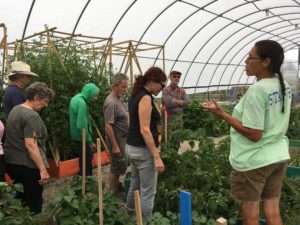
Poverty and the Simply Smiles Approach
On our first full day at the community center, volunteer organizer Sam Steinmetz told us about the history of the reservation, and about Simply Smiles. Much of what she told us was heartbreaking: there were suicides among children as young as twelve. The people of La Plant were too poor even for the Habitat for Humanity model of homeownership. She told us the history of the residential boarding schools, how Native American children were torn from their homes and forbidden to practice their cultures as they were forced to assimilate. I immediately wrestled with feelings of wishing I could do something to stop all the suffering, which swung quickly into a feeling of overwhelm.
Sam also told us about the work of Simply Smiles. Their mission was contained within the name, the profound yet simple intention to create a place of refuge based on the actual needs of the community. They created a space where there could be cause to smile. In effect, they bore witness to the suffering in this particular place, a small part of a reservation the size of Connecticut, and scaled deep instead of large.
The emphasis was to create an environment out of which leadership could emerge. Rather than trying to make a leader in their own image, the dedicated core staff and interns of Simply Smiles were instead strengthening the causes and conditions that give rise to leadership. The hope, Sam told us, was that by providing the community with what it needed to be strong and cohesive, the next Crazy Horse or Martin Luther King Jr could arise from within the reservation itself, from among the kids already there.
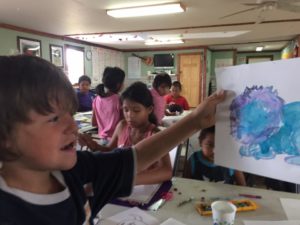 So, instead of coming in with a rigid model of what they assumed would work for a Native American reservation, Simply Smiles was present to the needs of this particular community and continues to respond to these needs by working in partnership with the Native people. Did they need a roof fixed? Did the kids need a summer camp? Did the older folks need a horseshoe tournament? Did everyone, Native and non-Native alike, need friendship and camaraderie? Care and connection were the organizing principles here, not a victim/rescuer relationship that reinforces separation. This created a sense of partnership in building and strengthening the community.
So, instead of coming in with a rigid model of what they assumed would work for a Native American reservation, Simply Smiles was present to the needs of this particular community and continues to respond to these needs by working in partnership with the Native people. Did they need a roof fixed? Did the kids need a summer camp? Did the older folks need a horseshoe tournament? Did everyone, Native and non-Native alike, need friendship and camaraderie? Care and connection were the organizing principles here, not a victim/rescuer relationship that reinforces separation. This created a sense of partnership in building and strengthening the community.
Tangible Changes
In the mornings we woke up and headed into construction projects. Some of us helped fix a La Plant resident’s roof, while others worked on building a bunk house so Simply Smiles could bring in double the amount of volunteers. Having never done any kind of construction, I was impressed with the flexible and empowering way the Simply Smiles staff organized the volunteers. I discovered that I love climbing scaffolding and using a power drill! I worked with Simply Smiles staff, other volunteers, and a few “kidterns,” who were teens from the reservation who studied closely with staff and volunteers to learn new skills.
One day towards mid-week, I was assigned to help install gutters that led to a cistern used to gather rainwater for the community garden. We had a sense of urgency since a storm was rolling in that night and we wanted to make sure to be done in time to capture all that rain. We had to be flexible, skillful, and problem-solve in a timely manner. And it all happened. It all came together and that night the cistern and gutter system we’d all played a hand in putting together captured 250 gallons of water for the community center to use. To be of tangible and direct service in that way was transformative. Doing what needs to be done with a sense of flexibility, lightness, and skillfulness isn’t something we can analyze and make happen, but when the causes and conditions are present, it works.
Practice and Possibility
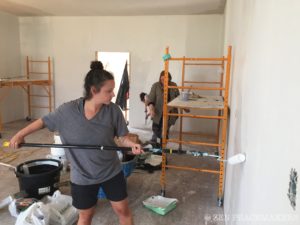 In the afternoons, after a lunch prepared with care by Simply Smiles staff (I’ll never forget the fried sage peace sign on top of some decadent mac & cheese!) we helped operate a summer camp for the La Plant kids. Some were as young as four and there were a good number of teenagers. Simply Smiles’ mission with the camp, as they described it to us, was to create a refuge for the kids. Their lives were impacted by intergenerational trauma and poverty and giving them opportunities to ‘simply smile’ while working to strengthen their community was an honor.
In the afternoons, after a lunch prepared with care by Simply Smiles staff (I’ll never forget the fried sage peace sign on top of some decadent mac & cheese!) we helped operate a summer camp for the La Plant kids. Some were as young as four and there were a good number of teenagers. Simply Smiles’ mission with the camp, as they described it to us, was to create a refuge for the kids. Their lives were impacted by intergenerational trauma and poverty and giving them opportunities to ‘simply smile’ while working to strengthen their community was an honor.
I’m not someone who considers myself fantastic with kids but it didn’t have to be any more complicated than pushing a child on a swing and laughing. Some of the children, I think, tried to provoke newcomers to say the thing they assumed you felt anyway. They’d test your boundaries. And if you rested in that middle place between snapping angrily and laughing in indulgence, they eventually dropped the defense mechanism and a connection could form.
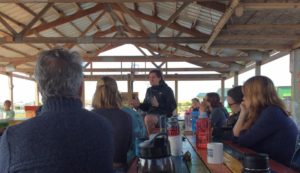
Another thing Simply Smiles did for the community was to host town-wide dinners and breakfasts. This was our time to talk with the Native folks who live on the reservation full time, and to practice the Three Tenets. In conversation and listening there is a fruitful and generative gap between my stories about what this country inflicted on Native People and the stories about what will fix their situation. In that gap is: friendship, conversation, pain, creativity, connection, sadness. All of these things make up a life.
I think sometimes we are afraid that someone else’s suffering will engulf us if we turn towards it. But it is only by sharing in someone else’s pain that I can also open up to and share in their joy. We so often want to jump in with what we think will fix someone’s suffering, but if I’m really paying attention I know that urge comes from my own discomfort. So what happens if I just sit and listen? Turns out, a lot can happen if I give that space to myself and others.
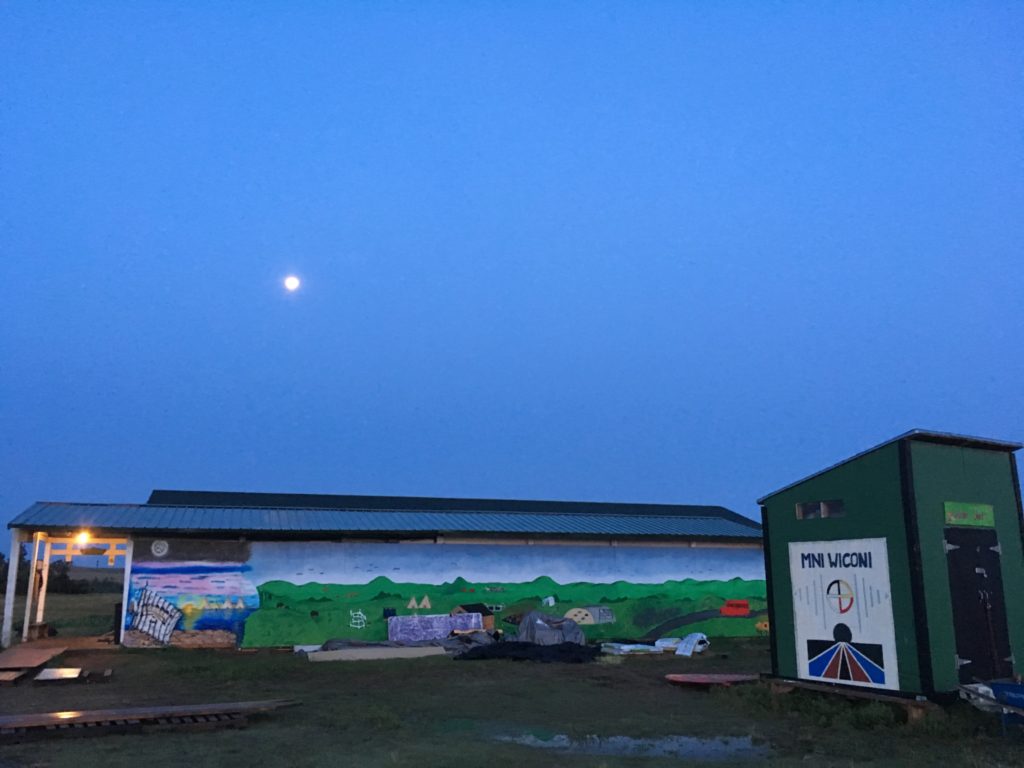
The View from Here: Looking Back, Looking Ahead
It was a generations-long vision that Bryan Nurnberger, Simply Smiles’ founder, presented to us towards the end of our visit to La Plant. To hear about work being done with such a long view, such a sense of commitment reminds me that Simply Smiles was here doing this work before today’s turbulent moment in history, and they are committed to continuing to do it no matter what obstacles arise.
The Native American people of La Plant and countless towns like it across the country have already had everything taken away from them when they were driven off their sacred land and forbidden to practice their culture. It felt grounding to have such a wide perspective of time in doing this work. America has never undergone a reconciliation process for what it did to the Native people it colonized, nor have we made reparations for the slavery that allowed this country to be built. I believe we are now grappling with this shadow as it fights for recognition. But I also believe that if we can hold that space, and continue to do this work of not knowing, listening, and acting from that space, then we stand a chance of transforming lives and regenerating all the connections that have been lost. This is what I witnessed in La Plant.
—
 Caroline Contillo is a writer and meditation teacher living in New York City. She has studied at The Interdependence Project, Shambhala Center of New York, and the Zen Center for Contemplative Care. She was also involved with the Occupy Meditation Working Group during Occupy Wall Street, and is currently studying to become a sound healer.
Caroline Contillo is a writer and meditation teacher living in New York City. She has studied at The Interdependence Project, Shambhala Center of New York, and the Zen Center for Contemplative Care. She was also involved with the Occupy Meditation Working Group during Occupy Wall Street, and is currently studying to become a sound healer.

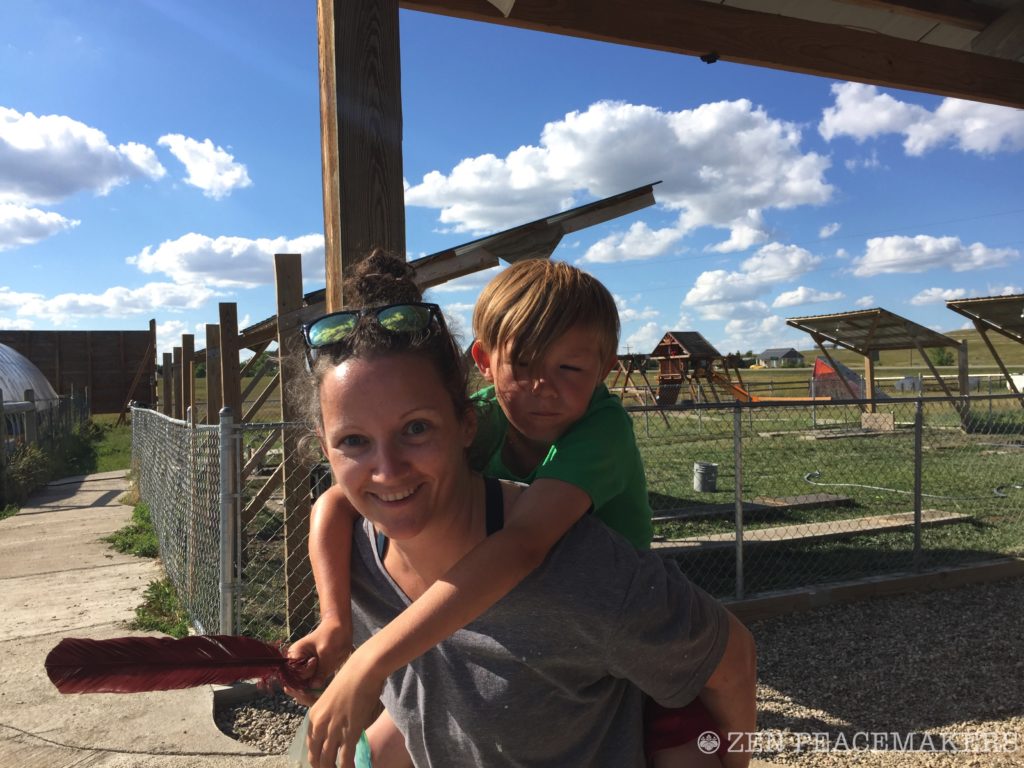

One Response
Your reaching out to our brothers and sisters in friendship is an act of Love. Immersed in harmony we are nourishing one another. The mystic poet Gibran challenges us all to peer deeply within our very being to answer the question: “What is it to work with LOVE? You who are giving of yourselves to this service of reciprocity is manifesting his response. “It is to sow the seeds with tenderness and reap the harvest with JOY!